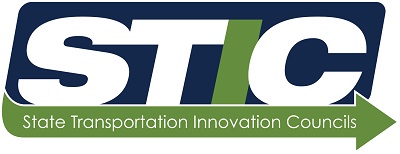State Transportation Innovation Council
The NH State Transportation Innovation Council (STIC) is a partnership of public and private transportation industry stakeholders that work together to evaluate innovative products and practices and to lead their incorporation into the next generation of New Hampshire's transportation network.
About Us
On 12/13/2017 the New Hampshire State Innovation Council (NH STIC) Charter was revised and approved. The NH STIC team consists of NHDOT Executives and Bureau Administrators, FHWA Division Administration, Regional Planning Commissions, NH Municipal Association, Associated General Contractors, and other entities that reflect the transportation industry. The NH STIC meets to discuss transportation advancements and to promote their use in New Hampshire. The Federal Highway Administration manages the STIC program.
Mission
The mission of the council is to identify projects, apply for federal funding, develop or evaluate new products and technologies, and to transfer the innovations into the construction projects of the future.
What's Happening
- National STIC Network Meetings, including the most recent meeting held on January 25, 2023, are recorded and available at:
- 2024 STIC funding is available, and applications will be accepted until September 30, 2023.
- Please use this template and submit the form to Deirdre.T.Nash@dot.nh.gov for consideration by the NH STIC.
- The NHDOT Decade of Innovation Viewer was published in February 2019 and provides information on the Department's innovation initiatives that have been put into practice across New Hampshire.
Scroll down to learn about NHDOT's successes with STIC Incentive Funds, the Accelerated Innovation Deployment (AID) Demonstration Program, and Every Day Counts (EDC) Initiatives.
STIC Incentive Funds
The Federal Highway Administration (FHWA) State Transportation Innovation Council (STIC) Incentive program provides resources to help STICs foster a culture for innovation and make innovations standard practice in their States. Through the program, funding up to $100,000 per State per Federal Fiscal Year (FFY) is made available to support or offset the costs of standardizing innovative practices in a State transportation agency or other public sector STIC stakeholder. A 20 percent non-Federal match is needed and may come from project sponsors or other allowable fund sources.
The Department was the first state to apply for and receive STIC incentive funds when initiated by FHWA. STIC Incentive Projects vary throughout the country and our goal has been to use these funds to move innovation into standard practice.
FFY 2023:
- Implement a balance mix design ($40,000) Status: Active
- Workforce Outreach Strategy for Public Works ($8,000) Status: Active
- Implement standardized e-Ticketing solution across construction projects. ($41,200) Status: Active
FFY 2022:
- Expand Digital Inspection Efforts ($100,000) Status: Completed
FFY 2021:
- Implement Culvert Outlet Diffuser ($20,000) Status: Completed
FFY 2020:
- Development of a Geotechnical Manual to include integrating innovation deployment guidance including A-GaME ($80,000) Status: Active
- Purchase and evaluate Unmanned Aircraft System (UAS) for use in NHDOT missions. Status: Completed
FFY2019:
- Working Environment for Creating 3D Models ($100,000) Status: Active
FFY 2018:
- Innovative Green Infrastructure Restoration and Resiliency Approaches for Linear Transportation ($24,955) Status: Completed
- NHDOT Stormwater Outreach Program ($10,000) Status: Completed
- Keeping up with Innovation adding FTIR and XFR Capability to the Toolbox ($24,000) Status: Completed
- High Resolution Rock Slope 3D mapping ($41,045) Status: Completed
FFY 2017:
- Develop 2D hydraulic models to be used in a training course and to promote the CHANGE initiative. ($17,600) Status: Completed
- Develop guidance and procedures for Design-Build Accelerated Project Delivery. ($16,000) Status: Completed
- Deploy dedicated short range communications (DSRC) infrastructure to respond to the AASHTO Signal Phasing and Timing Challenge (SPaT). ($66,400) Status: Completed
FFY 2016:
- Strategic Highway Research Program (SHRP2) Traffic Incident Management (TIM) Training. ($16,000) Status: Completed
- Implement e-Document Storage Solutions, including research, integration, preparing standard operating procedures, developing mobile applications, and training. ($84,000) Status: Completed
FFY 2015:
- Implementation of e-Construction through the expanded use of mobile devices. ($84,000) Status: Completed
- Development of a Design-Build guidance document. ($16,000) Status: Completed
FFY 2014:
- Development of a State Historic Architectural and Archeological Database. ($40,000) Status: Completed
- Purchase of new computers and development of design standards to support 3D Modeling efforts. ($30,000) Status: Completed
- Purchase of ground-penetrating radar equipment and software to support expedited project development and improved design practices. ($30,000) Status: Completed
Accelerated Innovation Deployment (AID) Demonstration Program
The AID Demonstration program provides funding as an incentive for eligible entities to accelerate the implementation and adoption of innovation in highway transportation. MPOs and local governments may apply through our Department as sub recipients. AID Demonstration funds are available at an 80 percent federal share, which require a minimum 20 percent cost share. Our awarded AID Demonstration grant funding includes the following:
FFY 2020:
Application Name: New Hampshire DOT – City of Nashua, NH Every Day Counts – 5: Safe Transportation for Every Pedestrian Program Implementation
Requested Amount: $452,000; Date Submitted: November 14, 2019; Status: Active
Application Name: New Hampshire DOT – TSMO – ATMS Web Transition
Requested Amount: $798,250; Date Submitted: October 7, 2019; Status: Declined
FFY 2017:
Application Name: New Hampshire DOT - City of Dover, NH Automated Traffic Signal Performance Measures (ATSPM) Implementation
Requested amount: $519,600; Date Submitted: May 5, 2017; Status: Active
Application Name: New Hampshire DOT – Ultra-High Performance Concrete Connections for PBES
Requested Amount: $621,925; Date Submitted: February 14, 2017; Status: Complete
FFY 2015: Application Name: New Hampshire DOT – University of New Hampshire, Bridge Monitoring; Grant Award: $355,000; Status: Completed
FFY 2014: Application Name: New Hampshire DOT – Asphalt Rubber Bonded Wearing Course (AR BWC); Grant Award: $895,892; Status: Completed
Every Day Counts (EDC)
In 2009, in cooperation with the American Association of State Highway and Transportation Officials (AASHTO), the Federal Highway Administration (FHWA) launched the Every Day Counts Initiative to identify and rapidly deploy proven but underutilized innovations to shorten the project delivery process, enhance roadway safety, reduce congestion and improve environmental sustainability. This program is funded by the FHWA and reports are produced annually.
Every two years, the Department attends an EDC summit to consider market readiness, impacts, and benefits, and ease of adopting innovations. Sometimes the new collection of innovations includes those that the Department has already institutionalized. At the summit, the Department sets an implementation goal and commits to finding opportunities to get the innovations into practice over the next two (2) years.
We are now in EDC Round 7 (2023-2024), and the Department has committed to advancing the implementation of the following innovations:
- Enhancing Performance with Internally Cured Concrete (EPIC2)
- Strategic Workforce Development
The Department's participation during Rounds 1 through 6 is outlined as follows:
- Crowdsourcing for Advancing Operations
- e-Ticketing and Digital As-Builts)
- Strategic Workforce Development
- Targeted Overlay Pavement Solutions (TOPS)
- Virtual Public Involvement (VPI)
- Advanced Geotechnical Exploration Methods
- Collaborative Hydraulics: Advancing to the Next Generation (CHANGE)
- Reducing Rural Departures
- Safe Transportation for Every Pedestrian (STEP)
- Unmanned Aerial Systems (UAS)
- Use of Crowdsourcing to Advance Operations
- Virtual Public Involvement
- Weather-Responsive Management Strategies
- Automated Traffic Signal Performance Measures (ATSPMs)
- Ultra-High Performance Concrete (UHPC)
- Collaborative Hydraulics: Advancing to the New Generation of Engineering (CHANGE)
- e-Construction and Partnering: A Vision for the Future
- Using Data to Improve Traffic Incident Management
- E-construction
- E-NEPA and IQED
- Smart Work Zones
- Regional Models of Cooperation
- Data Driven Safety Analysis
- Locally Administered Federal-aid Projects
- Programmatic Agreements
- 3D Engineering Models for Construction
- Accelerated Bridge Construction
- Intelligent Compaction
- SHRP2 TIM Training
- Expanding the Use of Programmatic Agreements
- Clarifying the Scope of Preliminary Design
- Design-Build
- Warm Mix Asphalt





